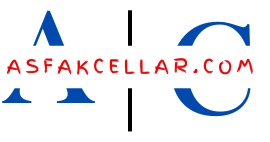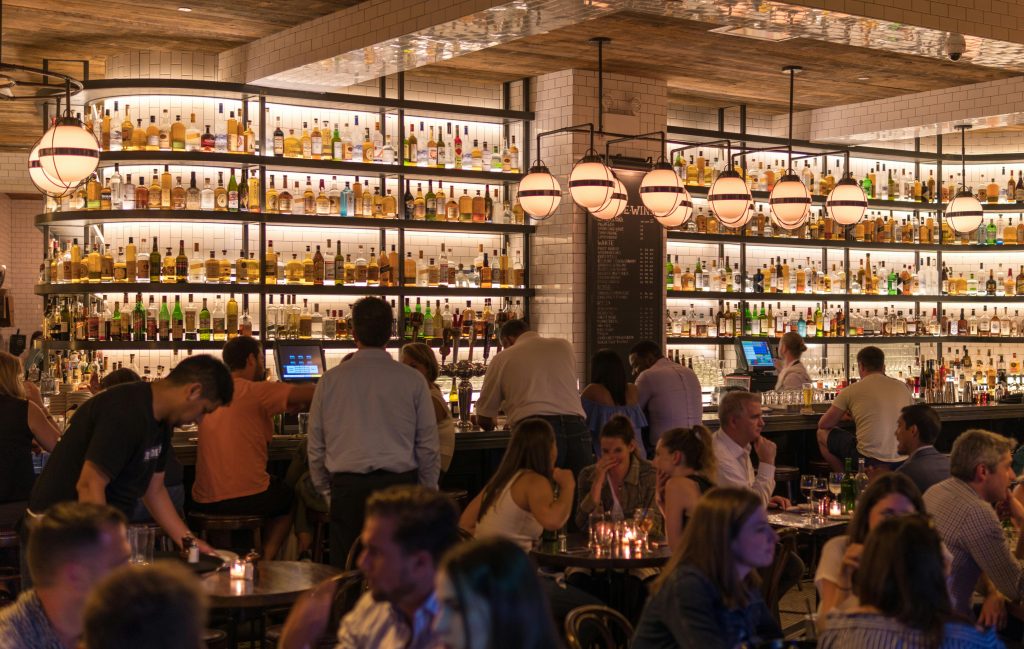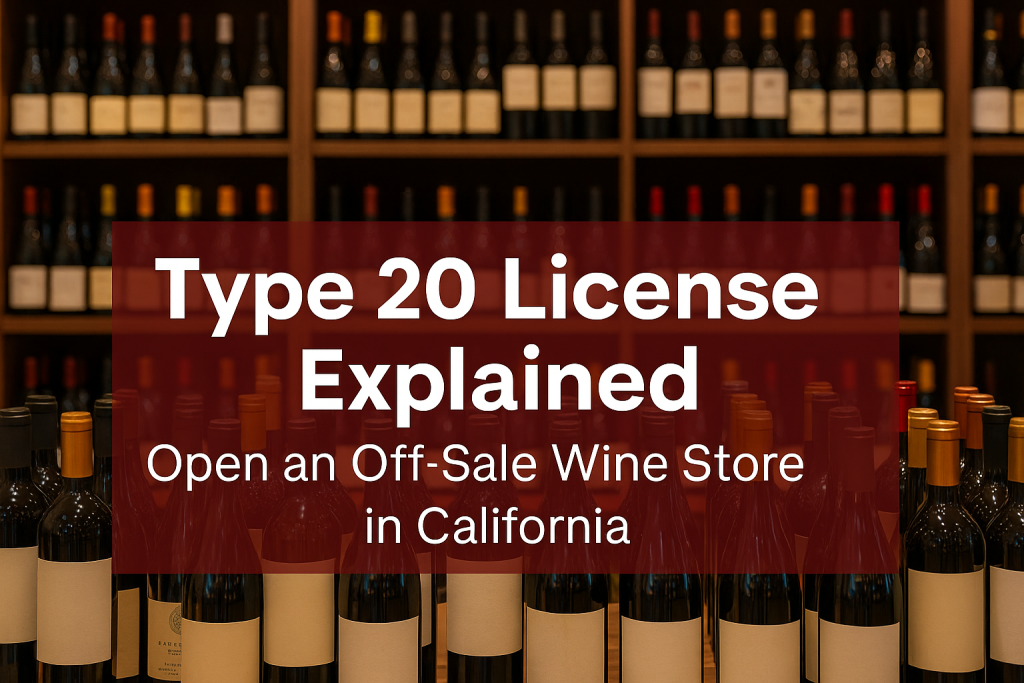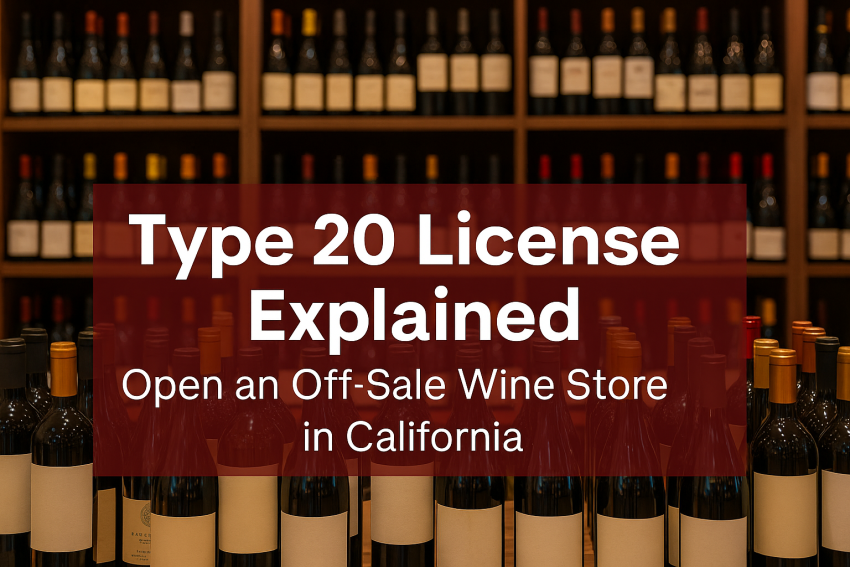Introduction
If you’re planning to open a wine shop or convenience store in California that sells alcoholic beverages for off-premises consumption, a Type 20 license is your golden ticket. This license, issued by the California Department of Alcoholic Beverage Control (ABC), allows you to sell beer and wine to-go, making it essential for liquor stores, grocery outlets, and retail chains.
In this guide, we’ll break down everything you need to know about the Type 20 license in California — from eligibility, costs, and application process to key compliance rules that can make or break your business.
What Is a Type 20 License in California?
A Type 20 license is officially defined as an “off-sale beer and wine license”. This means that the business can sell sealed containers of beer and wine to customers for consumption off the premises — not to be consumed on-site.
Quick Summary:
- Allowed to Sell: Beer and wine (not spirits)
- Consumption: Off-premises only
- Business Types: Grocery stores, wine shops, liquor stores, convenience stores
🔍 Note: If you want to sell hard liquor (distilled spirits), you’ll need a Type 21 license instead.
Who Needs a Type 20 License?
You’ll need a Type 20 license if you operate or plan to open a:
- Wine shop
- Grocery store
- Liquor store
- Mini-market
- Gas station with a shop
- Online wine delivery service (with local fulfillment)
Eligibility Requirements
Before applying for the Type 20 license in California, make sure you meet the following requirements:
Business & Zoning:
- Your business must be located in an area zoned for alcohol retail
- Local city or county approval is required
Owner Background:
- Must be 21 years or older
- No disqualifying criminal history
- Must be a U.S. citizen or legal resident
Premises:
- Proper floor plan
- Must comply with health, safety, and fire codes
How to Apply for a Type 20 License (Step-by-Step)
Step 1: Pre-Application Research
- Check local zoning laws
- Confirm if your city/county places a limit on alcohol permits
Step 2: File Application with California ABC
- Fill out ABC Form 211 (Application for Alcoholic Beverage License)
- Submit the form to your local ABC District Office
Step 3: Pay the Application Fee
Fees vary based on store location and population density. Expect:
- Initial Fee: $100–$400
- Annual Renewal Fee: $100–$250
Step 4: Posting & Public Notification
- A Public Notice of Application must be posted on the premises for 30 days
- Local residents or businesses may file objections
Step 5: Background Check & Site Inspection
- ABC will run a background check
- Inspect your location for zoning, layout, safety
Step 6: Local Government Review
- The city or county planning commission may request a hearing
- If approved, ABC issues your license
⚠️ Timeline: The whole process may take 45–90 days or longer if there are objections or zoning issues.
Fees for Type 20 License in California
| License Type | Initial Application Fee | Annual Renewal Fee |
|---|---|---|
| Type 20 | $100 – $400 | $100 – $250 |
Fees vary depending on business size, location, and alcohol sales volume.
Rules and Regulations for Type 20 License Holders
Once you get your license, you must follow strict compliance rules set by ABC. Violations can lead to suspension, revocation, or fines.
Key Rules:
- No on-site consumption of beer or wine
- Valid ID check for anyone appearing under 21
- No sales to intoxicated individuals
- Cannot sell between 2:00 AM and 6:00 AM
- Keep records of all alcohol purchases/sales
- Warning signs (e.g., “We card everyone”) must be posted
Common Violations to Avoid:
- Selling alcohol to minors
- Failing to check ID
- Allowing open containers on premises
- Operating without renewing your license
Can You Sell Wine Online with a Type 20 License?
Yes — but with conditions.
You can sell wine through your website or third-party apps, as long as:
- Wine is delivered by your own staff or a licensed delivery service
- Customers are 21+ and provide ID upon delivery
- You register with the California Department of Tax and Fee Administration (CDTFA) for alcohol sales tax
Type 20 vs. Type 21 License: What’s the Difference?
| Feature | Type 20 License | Type 21 License |
|---|---|---|
| Alcohol Types Allowed | Beer and Wine | Beer, Wine, and Distilled Spirits |
| Consumption | Off-premises only | Off-premises only |
| Common Use | Grocery or wine shops | Liquor stores |
| Cost | Lower | Higher |
Benefits of Holding a Type 20 License
Legally Sell Alcohol
You can expand your inventory with wine and beer, increasing revenue.
Boost Business Traffic
Alcohol sales attract more customers to small businesses and grocery stores.
Competitive Edge
Differentiate yourself from competitors who don’t sell alcoholic beverages.
Tips for Running a Successful Off-Sale Wine Store
- Choose popular, local, and imported wine varieties
- Use attractive shelving and chilled displays
- Train staff on alcohol compliance laws
- Offer discounts, bundles, and tasting (at special events, with proper permits)
- Create a wine club or loyalty program
Final Thoughts
If you’re serious about opening a wine shop or adding beer and wine to your grocery or retail business, the Type 20 license in California is your key to success. With the right paperwork, compliance, and business planning, you’ll be up and running in no time.
Remember — follow ABC regulations, respect your community’s zoning laws, and always prioritize safe, legal alcohol sales. That way, your wine store can thrive without legal trouble.
FAQs (Frequently Asked Questions)
❓ How long does it take to get a Type 20 license?
45 to 90 days depending on location, objections, and inspection.
❓ Can I sell hard liquor with a Type 20 license?
No. You’ll need a Type 21 license to sell distilled spirits.
❓ Do I need a separate license for online sales?
No, but you must comply with delivery, ID checks, and tax collection rules.
❓ What if someone complains about my license posting?
ABC may hold a public hearing, which could delay or deny approval.
Sources:
- California Department of Alcoholic Beverage Control (https://www.abc.ca.gov)
- California Retailers Association
- CDTFA (https://www.cdtfa.ca.gov)





1 thought on “Type 20 License Explained: Open an Off‑Sale Wine Store in California”